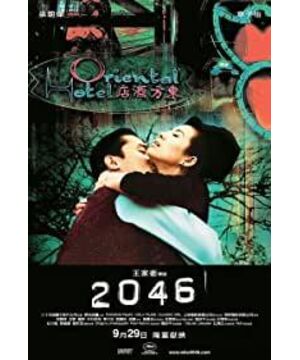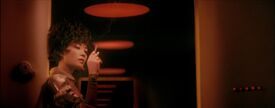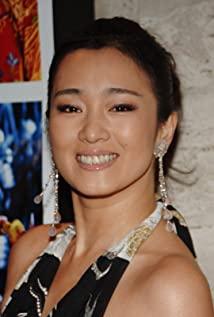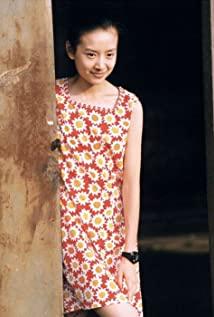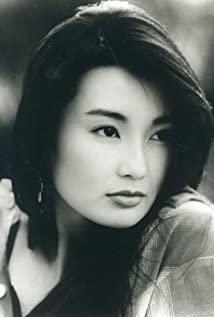1. Time
"Time" has always been the eternal expression motif in Wong Kar-wai's films. In the film text of "2046", time presents a stagnant or even static state, and even the title of the film is directly named after time. 2046 is not only a house number that Zhou Muyun has memories of in the past, but also a train number in an unknown time that he wants to escape from his memories. That is to say, 2046 is a simple house number under the instruction of the given thing. On the train of 2046, in this vague "future" time, 2046 itself means emotional escape, rejection, and forgetting. 2046 has its own signifier and signified in the film text. Time points to the "future", generating a huge discourse field, providing a sentimental spiritual world for Wong Kar-wai's nostalgia.
In contrast to the classic Hollywood narrative mode (the narrative of causal continuity), Wong Kar-wai's films break the continuum of time and space. He fragmented the time of the story and placed it in a moment, without the linear connection of past, present and future. In the time of Wong Kar-wai's texts, the characters naturally have an unreal feeling of not knowing when they are. In "2046", Zhou Muyun met professional gambler Su Lizhen in Singapore, Lulu met in Hong Kong nightclub, and Bai Ling met in 2046's apartment, giving a vague sense of time. Wong Kar-wai's time design in "2046" either places time and space at one point, or a certain time and space is infinitely elongated. Time has no basis to follow here, and memory will lose its basis, and when amnesia becomes the motivation to pursue, the movie "2046" is full of nostalgic helplessness. This is also a portrayal of a kind of amnesia mentality of Hong Kong people after 1997. The interstitial nature of time brought by 1997, this unique experience and hesitation of time, directly presented in the film is a kind of combination of nostalgia and nostalgia. The historical concept and spiritual characteristics of destiny are integrated, and this experience and experience will still image Wong Kar-wai and his images for a certain period of time.
Second, the emotional loss of urban people in the postmodern context
Jameson: "I use the time Spatialization connects these two sets of features (surface and fracture). Time becomes the eternal present and therefore spatial. Our relationship to the past also becomes spatial... In this new postmodern In the space, we have lost the ability to position ourselves and the ability to describe this space cognitively. The final diagnosis I made is the confusion that exists in the new postmodern space. This culture is a kind of centerless. , a culture that cannot be visualized. In this culture, people cannot position themselves. This is the conclusion."
The fracture of time and space in "2046", Zhou Muyun's emotional rejection, escape, and forgetting are reflected in a kind of aftermath. In the modern context, the separation of the individual and the society, the appearance of the estrangement between the individual and the individual. In the post-modern social environment, individuals cannot find their own position, and beliefs and feelings cannot satisfy their own desires and needs. The sad nostalgic complex in "2046" is just an imaginary that cannot be extricated from one's own old world. It is an anxious mental state of contemporary people, specifically the "schizophrenic lonely state" at the end of the century. .
This kind of emotional loss of urbanites in the postmodern context is reflected in Wong Kar-wai's "2046", which is the dissolution of the narrative style of classic films. Time and space condense into a single point, without the linear effect of history. Thus turning to the inner activities of the characters and paying attention to the inner flow of the characters. Zhou Muyun rejects the group and cannot do without the group. He feels lonely in the group, he longs to be embraced by others, longs for affection but is afraid of rejection from others, keeps hurting himself and others, refuses to remember but longs for memory. Everyone in "2046" is like this, Bai Ling, who is in love but dare not love, Lulu, who is escaping from love...
In "2046", people's life is a kind of helplessness, a kind of refusal and looking in between. In all Wong Kar-wai's images, people living in a postmodern context live lonely and sad in a bustling and noisy city.
View more about 2046 reviews


